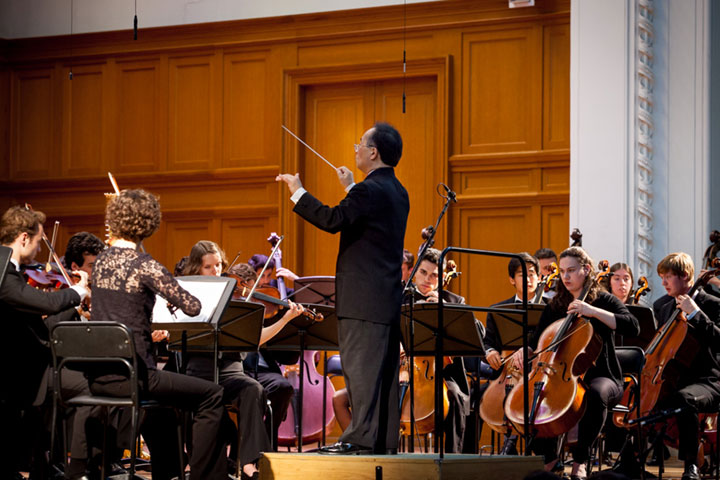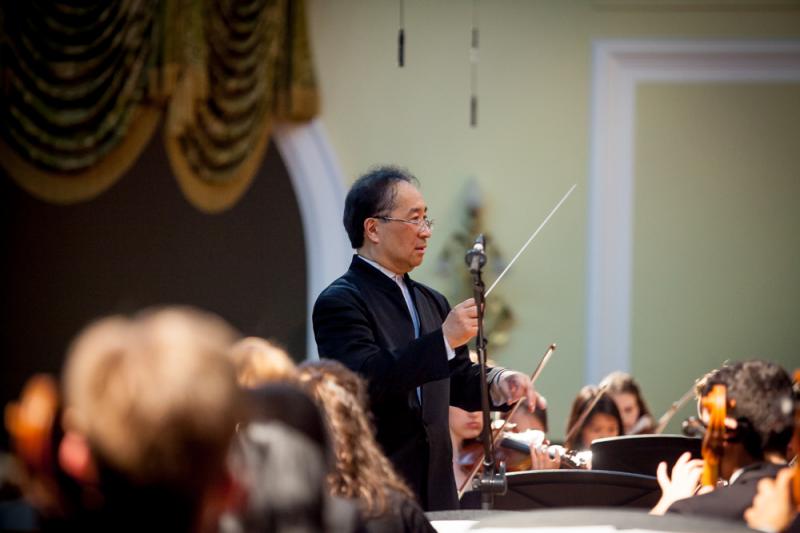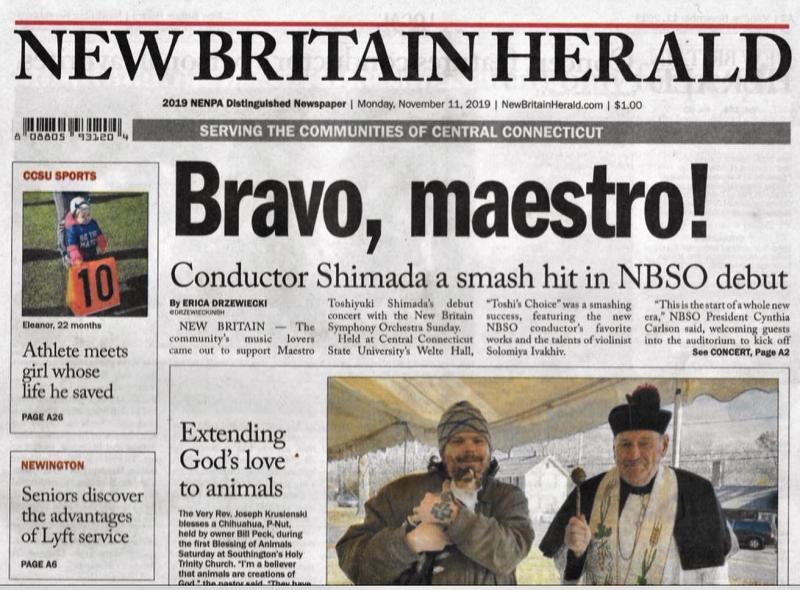TOSHIYUKI SHIMADA
Music Director and Conductor
Eastern Connecticut Symphony Orchestra
Reviews
Review: New Britain Herald, New Britain, Connecticut
by Dawn Hoffman
"The highlight of the concert, for me, was the NBSO's rendition of Dmitri Shostakovich's Symphony No. 5. The piece came alive under Shimada's direction, the Maestro, at times, practically taking flight at his podium. I was swept away by the music, and judging by the spirited standing ovational the close of the piece, I was not alone. It was really sorting!"
Review: The Day, New London, Connecticut
by Lee Howard
"Two other pieces on the night, Maurice Ravel’s “Rapsodie espagnole” and Christopher Rouse’s “Rapture,” were equally engaging.
"Rapture," one of the few ECSO performances featuring a living composer, is a real find, starting out as a tone poem solidified by the ostinato line of the double basses and featuring bird-like melodies in the flute section as well as the interesting juxtaposition of the bassoon and violin.
As the tempo gradually increases throughout the piece, the brass and percussion sections become more prominent, with the unusual scoring calling for a bass drum, triangle, tam-tam, chimes and glockenspiel. The unusual combinations in the percussion section combined with the gradually increasing tempo required a circus-like performance by Shimada, who brilliantly cued players and held the sections together as the piece came to its thrilling and beautiful ending.
Ravel’s masterpiece, a big and brooding homage to the composer’s Basque heritage, needed no introduction to the ECSO crowd, and as with other works on the night Shimada did not offer one, an unusual departure for the maestro. Instead, he let his players do the talking, spinning out a dramatic interpretation of the Spanish melodies, full of fire and rhythmic perfection featuring castanets and the tambourine. The final festival movement brimmed with lively playing, particularly in the woodwinds, bringing the evening to an exciting and upbeat conclusion.
Review: Sanattan Yansimalar, Ankara, Turkey
Presidential Symphony Orchestra of Turkish Republic
English Translation coming soon.
Review: the Music Life, Moscow, Russian Federation
Yale Symphony Orchestra at the Great Hall of the Moscow State Conservatory

Reveiw: the Music Season, Moscow, Russian Federation
Yale Symphony Orchestra at the Great Hall of the Moscow State Conservatory

Review from the Music Season, Moscow, Russian Fedration
ГАСТРОЛИ ЙЕЛЬСКОГО СИМФОНИЧЕСКОГО ОРКЕСТРА В РОССИИ
Владимир ОЙВИН («Музыкальные сезоны»)
The translation below the Russian text.
Симфонический оркестр, Yale Symphony Orchestra (YSO), бытующий при Йельском университете, с 24 мая по 4 июня 2017 года совершил гастрольный тур по России. Концерты прошли в Великом Новгороде, Санкт-Петербурге, Москве и Ярославле. За дирижёрским пультом стоял художественный руководитель оркестра маэстро Тошиюки Шимада.
Йельский университет, наряду с Принстоном и Гарвардом, входит в «Большую тройку» самых престижных университетов США. Пятеро из его выпускников стали президентами США: Уильям Тафт, Джеральд Форд, Джорджи Буши – старший и младший, Билл Клинтон. Йельский университет закончили композитор Чарльз Айвз – один из немногих американских композиторов, получивших мировую известность, писатель Синклер Льюис – первый американский лауреат Нобелевской премии по литературе и Уильям Бакли, отец современной консервативной мысли.
Йельский университет находится в г. Нью-Хейвене, одном из старейших городов Новой Англии, в штате Коннектикут (США), в 120 километрах на северо-восток от Нью-Йорка. Университет основан в 1701 году десятью пуританскими священниками и в 1718 году назван именем британского купца и филантропа Эли Йеля.
В состав университета входят двенадцать подразделений: Йельский колледж, четырёхлетнее образование в котором завершается получением степени бакалавра; аспирантура по различным специальностям, включающим точные, естественные и гуманитарные науки, а также 10 профессиональных факультетов, готовящих специалистов в области юриспруденции, медицины, бизнеса, охраны окружающей среды, а также теологов, архитекторов, музыкантов, художников и актёров.
В Йеле созданы несколько музеев, в числе которых Музей музыкальных инструментов, в коллекции которого есть альт, изготовленный в 1689 году. Кроме симфонического оркестра при университете, существует вокальный коллектив Schola Cantorum, получивший международное признание, и Йельский октет. Коллектив Schola Cantorum гастролировал в большинстве европейских стран (в России в июне 2016 года) и в Азии, имеет многочисленные записи. Schola Cantorum специализируется на исполнении старинной и современной академической музыки.
В составе Йельского симфонического оркестра более шестидесяти музыкантов. В 2006 году художественным руководителем оркестра стал Тошиюки Шимада.
YSO был основан в 1965 году группой студентов-энтузиастов в рамках университета. YSO дает студентам-любителям возможность познать музыку изнутри, на консерваторском уровне, получая при этом качественное гуманитарное или естественно-научное образование. В беседе после московского концерта маэстро Шимада отметил, что «он поражен, как студенты находят время от основной учебы, чтобы играть в оркестре. Ведь это факультатив, и никто их не заставляет».
До 90% участников оркестра – непрофессиональные музыканты – становятся по окончании университета успешными врачами, юристами, физиками, и т. д. Некоторые выходцы из YSO стали музыкантами Нью-Йоркского и Лос-Анжелесского филармонических оркестров, Бостонского, Сан-Францисского, Филадельфийского и других известных симфонических оркестров.
Маэстро Шимада рассказал:
«В репертуар YSO входит много разной музыки, в том числе и той, что пишут сами студенты, преподаватели и выпускники Школы музыки и музыкального факультета Йельского университета. Ну и, конечно, классика: Моцарт, Брамс, Чайковский. Рихард Штраус, Малер – недавно играли его Пятую симфонию. Каждые два-три года оркестр путешествует. Мы сообща решали, куда нам направиться: в Испанию, или в тур по США и Канаде, но потом решили поехать в Россию, Потому что Россия – страна, известная своей музыкой. Конечно, такой тур – дорогое удовольствие. Поэтому половину тура оплатил российский меценат, а половину сам оркестр».
На протяжении всей своей 52-летней истории YSO исполняет новые произведения. В 1973 году оркестр осуществил европейскую премьеру «Мессы» Леонарда Бернстайна, мировую премьеру финальной восстановленной версии «Трёх селений в Новой Англии» Чарльза Айвза, американскую премьеру музыки к балету «Камма» Клода Дебюсси.
Для гастролей в России Йельский симфонический оркестр подготовил программу американских и русских авторов. Это Увертюра Сэмуэля Барбера к комедии Р. Б. Шеридана «Школа злословия», Третий фортепианный концерт Белы Бартока – многие в США считают его американским композитором (солист – выпускник Московской консерватории Борис Берман); Пятая симфония Чайковского. В Ярославле в программу концерта было включено ещё и «Испанское каприччио» Римского-Корсакова.
В Москве Йельский симфонический оркестр дал 31 мая дневной концерт в Большом зале консерватории. Зал был практически полон. Как отметил сам дирижёр: «Мы знали, что играем в самом престижном зале Москвы. Все очень нервничали. При исполнении увертюры Барбера оркестранты были очень напряжены и скованны. Это, безусловно, сказалось на качестве звучания оркестра». С этой оценкой маэстро трудно не согласиться. В увертюре Барбера оркестр звучал жёстко и местами довольно пёстро.
После того, как исполнение Увертюры Барбера было всё-таки тепло встречено слушателями, понятное напряжение спало, и Третий фортепианный концерт Бартока в оркестре получился гораздо более раскованным. В звучании оркестра появилось больше динамических оттенков и красок. Красиво звучала первая половина второй части Третьего фортепианного концерта Adagio religioso. В ней слышатся слёзы композитора, чьё творчество не нашло понимания и успеха в США (где он подолгу жил в 30-е годы прошлого века и куда эмигрировал с семьей в 1940 году, когда его существование в Венгрии при фашистском режиме Хорти стало опасным для жизни).
Я особо поблагодарил маэстро Шимаду за включение в программу гастролей великолепного Третьего фортепианного концерта Бартока, музыка которого неоправданно редко звучит в России. Маэстро ответил, что в работе над концертом ему помогла жена – родом из Словакии, но имеющая венгерские корни.
Солировавший в концерте Бартока Борис Берман, учившийся в Москве у Льва Оборина, был особенно убедителен в исполнении Adagio religioso.
Наиболее удачно Йельский симфонический оркестр исполнил Пятую симфонию Петра Чайковского, к началу которой молодые музыканты полностью справились с волнением и сумели показать свой настоящий творческий потенциал. Несмотря на любительский состав оркестра, он в Пятой симфонии Чайковского неожиданно прозвучал вполне профессионально.
Маэстро Шимада как интерпретатор популярного сочинения не пошёл по пути копирования российских стандартов его исполнения, а привнёс в него свои акценты и агогику. Убедительны оказались слегка замедленные темпы и несколько уменьшенная динамика, снизившая привычную пафосность российских прочтений этой симфонии. У Шимады она прозвучала более лиричной, человечной. Сам маэстро сказал, что, несмотря на немногие накладки, практически неизбежные при живом исполнении, он доволен исполнением Пятой симфонии Чайковского.
Маэстро Шимада остался доволен приёмом, оказанным российскими властями и слушателями оркестру американских студентов. В Великом Новгороде их хлебом-солью приветствовал мэр города. Художественный руководитель YSO отметил высокую культуру и степень образованности российских слушателей – не аплодирующих, в отличие от американских, в перерывах между частями симфонии Чайковского.
The Yale Symphony Orchestra’s tour of Russia
Vladimir Oivin (Music Seasons)
The Yale Symphony Orchestra (YSO), which is part of Yale University, conducted a tour of Russia from May 24 to June 4, 2017. Concerts were held in Veliky Novgorod, St. Petersburg, Moscow, and Yaroslavl. Behind the conductor’s podium was the artistic director of the orchestra, Maestro Toshiyuki Shimada.
Yale University, along with Princeton and Harvard, is in the “Big Three” of the most prestigious universities in the USA. Five of its graduates became US presidents: William Taft, Gerald Ford, George Bush Sr. and Jr., and Bill Clinton. Yale University’s alumni include the composer Charles Ives, one of the few American composers to achieve worldwide fame; the writer Sinclair Lewis, the first American Nobel Laureate in Literature; and William Buckley, the father of modern conservative thought.
Yale University is located in New Haven, one of the oldest cities in New England, in Connecticut, 120 kilometers northeast of New York. The university was founded in 1701 by ten Puritan ministers and in 1718 was named after the British merchant and philanthropist Eli Yale.
The University consists of twelve schools: Yale College, which offers a four-year curriculum that ends with a bachelor’s degree; postgraduate studies in various specializations, including the sciences and humanities, as well as 10 professional schools that train specialists in the fields of law, medicine, business, forestry, as well as theologians, architects, musicians, artists, and actors.
At Yale, several museums have been established, including the Collection of Musical Instruments, which features a viol made in 1689. At the university, in addition to the Symphony Orchestra, there is a chamber choir called the Schola Cantorum, which has received international recognition, and the Yale Octet. The Schola Cantorum has toured in most European countries (they were in Russia in June 2016) and traveled to numerous countries in Asia. The Schola Cantorum specializes in the performance of both older and contemporary sacred music.
The Yale Symphony Orchestra includes more than sixty musicians. In 2006, Toshiyuki Shimada became the artistic director of the orchestra.
The YSO was founded in 1965 by a group of student enthusiasts in the university. The YSO gives student amateurs the opportunity to learn music from the inside, at the conservatory level, while receiving a quality education in the humanities or sciences. In an interview after the Moscow concert, Maestro Shimada noted that he is “amazed how students find time from their studies to play in the orchestra. After all, this is an elective, and no one forces them.”
Up to 90% of the orchestra members—non-professional musicians—become successful doctors, lawyers, physicists, etc., after they graduate from the university. Some YSO students have become musicians in the New York and Los Angeles Philharmonic Orchestras, as well as Boston, San Francisco, Philadelphia, and other well-known symphony orchestras.
Maestro Shimada said, “The YSO repertoire includes a lot of different music, including music written by students, teachers, and graduates of Yale’s School of Music and Music department. And, of course, the classics: Mozart, Brahms, Tchaikovsky. Richard Strauss, Mahler—we recently played his Fifth Symphony. Every two to three years the orchestra travels. Together we decided where we should go: to Spain, or to tour the US and Canada, but then we decided to go to Russia, because Russia is a country known for its music. Of course, such a tour is an expensive pleasure. Therefore half of the tour was paid for by a Russian philanthropist, and half by the orchestra itself.”
Throughout its 52-year history, YSO has performed new works. In 1973, the orchestra performed the European premiere of MASS by Leonard Bernstein, the world premiere of the final restored version of Three Places in New England by Charles Ives, and the American premiere of music for the ballet Khamma by Claude Debussy.
For its tour in Russia, the Yale Symphony Orchestra prepared a program of American and Russian composers. It includes Samuel Barber’s Overture to the R.B. Sheridan comedy The School for Scandal, Bela Bartok’s Third Piano Concerto (many in the US consider Bartok an American composer) with soloist Boris Berman, graduate of the Moscow Conservatory; and Tchaikovsky’s Fifth Symphony. In Yaroslavl, the concert program also included Rimsky-Korsakov’s Capriccio Espagnol.
In Moscow, the Yale Symphony Orchestra gave a daytime concert on May 31 in the Great Hall of the Conservatory. The hall was almost full. As the conductor himself noted, “We knew that we were playing in the most prestigious hall in Moscow. Everyone was nervous. In the performance of Barber’s Overture, the orchestra was very tense and constrained. This, of course, affected the sound quality of the orchestra.” It is hard to disagree with the maestro’s assessment. In Barber’s Overture, the orchestra sounded stiff and, at times, quite patchy.
After the performance of Barber’s Overture was nonetheless warmly received by the audience, the understandable tension subsided, and the orchestra’s rendition of Bartok’s Third Piano Concerto was much more relaxed. In the orchestra’s sound, more dynamic shades and colors appeared. The first half of the second movement of the Third Piano Concerto, Adagio religioso, sounded beautiful. One can hear the tears of the composer, whose work was not successful or understood in the US (where he lived in the 30s and emigrated with his family in 1940, when his existence in Hungary under Horthy’s fascist regime became imperiled).
I particularly thanked Maestro Shimada for including in the tour program the magnificent Third Piano Concerto of Bartok, whose music, for no good reason, is rarely heard in Russia. The Maestro replied that in his preparation for the concert he was assisted by his wife—she is a native of Slovakia, but has Hungarian roots.
The soloist in Bartok’s concerto, Boris Berman, who studied in Moscow with Lev Oborin, was especially persuasive in his performance of Adagio religioso.
The Yale Symphony Orchestra’s most successful performance was of Pyotr Tchaikovsky’s Fifth Symphony. By the beginning of this piece, the young musicians completely overcame their nerves, and were able to show their real creative potential. Despite the fact that it is an amateur orchestra, in Tchaikovsky’s Fifth Symphony, it surprisingly sounded quite professional.
Maestro Shimada, as the interpreter of this popular work, did not copy the Russian manner of interpretation, but brought his own agogic accents into it. Persuasive were the slightly slowed down tempo and somewhat reduced dynamics, which lessened the usual pathos of Russian interpretations of this symphony. Under Shimada, the symphony sounded more lyrical and humane. Maestro himself said that, despite a few glitches, almost inevitable in a live performance, he was satisfied with their performance of Tchaikovsky’s Fifth Symphony.
Maestro Shimada was pleased with the reception that this orchestra of American students was given by Russian authorities and listeners. In Veliky Novgorod, the mayor greeted them with bread and salt. The artistic director of the YSO noted the high level of culture and education of Russian listeners—not applauding, unlike Americans, in the intervals between movements of Tchaikovsky’s symphony.
For the encore, the YSO brightly performed a selection from Aram Khachaturian’s incidental music to Lermontov’s drama Masquerade.
Toshiyuki Shimada. All rights reserved.

